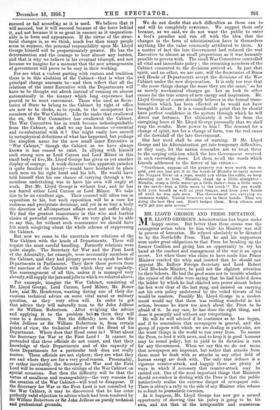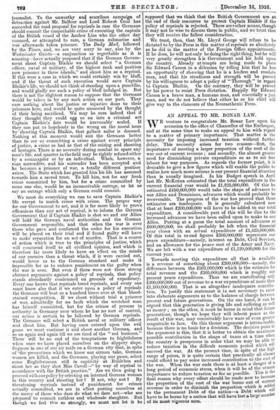MR. LLOYD GEORGE AND PRESS DICTATION.
AIR. LLOYD GEORGE'S Administration has begun under happy omens. But better than these omens was the courageous action taken by him while his Ministry was still in process of formation. He refused absolutely to be dictated to by the Northcliffe Press. That he and his supporters were under great obligations to that Press for breaking up the former Coalition and giving him an opportunity to try his hand at the conduct and management of the war is an open secret. Yet when those who claim to have made him Prime Minister cracked the whip and insisted that he should not appoint Mr. Balfour Foreign Secretary and Lord Robert Cecil Blockade Minister, he paid not the slightest attention to their behests. He had the good sense not to trouble whether the cynics of the clubs were saying that he had kicked down the ladder by which he had climbed into power almost before his feet were clear of the last rung, and insisted on carrying out his own policy undeterred by the veiled threats of his would-be masters. Possibly Mr. Lloyd George in a modest mood would say that there was nothing wonderful in his action, because he knew too much about the Press to be afraid of it. In any case, he has done the right thing, and done it promptly and without any temporizing. He will be well advised if he continues as he has begun, and if he remembers that newspapers in general, and the group of papers with which we are dealing in particular, are the worst things in the world to run away from. To amuse the Press, to feed it with news, and to keep it in good humour may be sound policy, but to yield to its dictation is ruin for any Government. When we say this we do not mean that newspapers are impotent, but rather that attacks from them must be dealt with as attacks in any other field of human energy are dealt with. The only true defence is a vigorous counter-attack, and happily there are plenty of ways in which if necessary that counter-attack may be carried out. One of the most important things that Ministers should remember in dealing with the Press is that the public instinctively realize the extreme danger of newspaper rule. There is always a rally to the side of any Minister who refuses to submit to journalistic coercion. As it happens, Mr. Lloyd George has now got a second opportunity of showing that his policy s going to be his own, and not that of the irresponsible and sensations, journalist. To the .unworthy and scurrilous campaign of detraction against Mr. Balfour and Lord Robert Cecil has succeeded the mad proposal for reprisals in case the Germans should commit the unspeakable crime of executing the captain of the British vessel of the Anohor Line who the • other day rammed, or attempted to ram, a German submarine and was' afterwards taken prisoner. The Daily Mail, followed by the Times, and, we are very sorry to say, also by the Westminster Ga:ette—a conjunction as regrettable as it is amazing—have actually proposed that if the German Govern- ment shoot Captain Blaikie we should select " a German officer, naval or military, of the highest rank and position now prisoner in these islands," and shoot him as a reprisal. If this, were a case in which we could certainly win by bluff, and if the threat of such execution would save Captain Blaikie's life, we should not think of standing upon a punctilio, and would gladly see such a policy of bluff indulged m. But there is not the slightest reason to suppose that the Germans would be taken in by any such action on our part. They care nothing about the justice or injustice done to their prisoners here, and would be quite unmoved by the thought of their being sacrificed. We may be sure indeed that if they thought they could egg us on into a criminal act Captain Blaikie's fate would be irrevocably sealed. If • they can put us hopelessly in the wrong on the moral issue by-shooting Captain Blaikie, that gallant sailor is doomed. Nothing at this moment would suit the Germans better than to see us committing a crime against every principle of justice, a crime as bad as that of the seizing and shooting of hostages. There is no necessity during combat to spare any man's life, and quarter in the field may be rightly refused either by a comma der or by an individual. When, however, a • man surrendFrs; and his surrender has been accepted and he beComes a prisoner of war, a 'totally different position arises. • The State which has granted him his life has assumed towards him a sacred trust. To kill him, not for any fresh crime committed by him, but for a crime committed by some one else, would be an inconceivable outrage, or let us say an outrage which only a German could commit.
We must do everything we can to save Captain Blaikie's life except to match crime with crime. The proper way for our Government to act, and it is far more likely 'to prove efficacious than any act of reprisal, is to inform the German Government that if Captain Blaikie is shot we and our Allies' will hold the German naval authorities and the German Government responsible, 'and that when the war is over those who gave and confirmed the order for his execution will be placed on their trial and if found guilty will have to make reparation for an act of murder. That is a course of action which is true to the principles of justice, which will commend itself to all civilized opinion, and which is therefore far more likely to have an effect on the minds of our enemies than a threat which, if it were carried out, would lower us to the German standard and make it impossible for us to enforce punishment on the guilty when the war is over. But even if there were not these strong abstract arguments against a policy of reprisals, that policy stands abundantly condemned on grounds of expediency. Every one knows that reprisals breed reprisals, and every one must know also that if we enter upon a policy of reprisals the Germans will beat us a hundred times over at that blood- stained competition. If we shoot without trial a prisoner of war, admittedly for no fault which the wretched man has himself committed, but for the crimes of persons in authority in Germany over whom he has no sort of control, • our action is certain to be followed by German reprisals. The Germans will select a British naval or military officer and shoot him. But having once entered upon the evil game we must continue it and shoot another German, and • so on again and again till we are tired of the " red business." There' will be no end of the temptations to frightfulness when once we have placed ourselves on the slippery slope. Suppose in one of our air raids on a German city that, in spite of–the precautions which we know our airmen take, German women are killed, and the Germans, playing our game, select some 'Englishwoman still in captivity at Ruhleben and shoot her as they shot Miss Cavell— by way of reprisal in accordance with the British practice." Are we then going to proceed with our policy by selecting an interned German woman in this country and shooting her I If not, why not I By threatening • reprisals instead of punishment for crimes actually committed, we are in effect putting ourselves at the mercy of those who dare do what we dare not—who are prepared to commit ruthless and wholesale slaughter. But though we feel this so strongly, we must not let it be supposed that we think that the British Government are at the end of their resources to protect Captain Blade if the policy of reprisals is rejected. There are other means, though it may not be wise to discuss them in public, and we trust that they will receive the fullest consideration.
We trust, then, that Mr. Lloyd George will refuse to be dictated to by the Press in this matter of reprisals as absolutely as he did in the matter of the Foreign Office appointments. If he does, he will not only be doing the right thing, but he will very greatly strengthen is Government and his hold upon the country. Already at tempts are being made to place Sir. Edward Carson in a di lemma by telling him that he has an opportunity of showing that he is a fearless and resolute man, and that his steadiness and strength will be proved by his willingness to adopt a policy of " Thorough " in regard to Captain Blaikie. On the contrary, they will be proved by his power to resist Press dictation. Happily Sir Edward Carson is a brave man, a humane man, and essentially a just man, and we do tot believe that either he or his chief will give way to the clamours of the Neurasthenic Press.



































 Previous page
Previous page